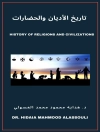B. H. Roberts’ ‘Outlines of Ecclesiastical History’ is a meticulous examination of the evolution of the Christian Church, exploring its growth, turmoil, and theological debates from its inception through significant historical milestones. Roberts employs a scholarly yet accessible literary style, combining narrative clarity with analytical depth, making this work a vital resource for understanding the intricacies of ecclesiastical developments. The book is situated within a broader discourse on religious history and is particularly notable for how it addresses the intersection of faith and institutional authority, a theme deeply rooted in the challenges faced by early Christians and their various sects. B. H. Roberts, a prominent figure in early 20th-century Mormon thought, was actively engaged in both theological discourse and historical investigation. His background in religious studies and his roles within the Latter-day Saint movement undoubtedly informed his perspective on ecclesiastical history. Roberts’ dual identity as a historian and theologian allows him to draw upon both scriptural sources and historical documentation, providing a comprehensive overview that is both reverent and critical of its subjects. I wholeheartedly recommend ‘Outlines of Ecclesiastical History’ for readers interested in the complexities of church history and its implications for modern faith. This work not only serves as a valuable reference but also invites readers to ponder the ongoing relevance of early ecclesiastical struggles in today’s religious landscape.
About the author
Brigham Henry Roberts (1857–1933), commonly known as B. H. Roberts, was a seminal figure in Mormon history and literature. An intellectual powerhouse of the Latter-day Saint movement, he was a prolific writer, historian, and theologian. Born in England, Roberts immigrated to the United States as a child and joined the Church of Jesus Christ of Latter-day Saints (LDS Church). His written work ‘Outlines of Ecclesiastical History’, first published in 1893, provides a comprehensive look at the history of the Christian church from a Latter-day Saint perspective, establishing Roberts’ reputation as a religious scholar. His scholarly works are known for their meticulous research, narrative strength, and his capacity to address complex theological issues in accessible prose. A member of the First Council of the Seventy of the LDS Church, Roberts not only wrote about church history and doctrine but also engaged deeply in the legislative and cultural life of his time. He served multiple terms as a representative in the Utah state legislature and made a bid for the United States Congress. His literary style often reflects his commitment to his faith and his belief in the relevance of religious history to contemporary issues. Among his numerous works, B. H. Roberts is also noted for ‘The Life of John Taylor’, a biography of the third president of the LDS Church, and the comprehensive seven-volume ‘History of the Church of Jesus Christ of Latter-day Saints’. His contributions to Mormon historiography and theology continue to be widely studied and esteemed.




